- Home
- M. K. Hume
King Arthur: Dragon's Child: Book One (King Arthur Trilogy 1) Page 9
King Arthur: Dragon's Child: Book One (King Arthur Trilogy 1) Read online
Page 9
Artorex shrugged. Lineage was of little interest to a fatherless man.
‘And so Caius is allowed to beat Julanna, and everyone in the Villa Poppinidii knows about it,’ Gallia stated with conviction. ‘How cowardly!’
Artorex shrugged once more. The truth was self-evident.
‘Is there anyone here who can protect her from Caius?’
‘No one at all, if the Mistress Livinia decides to turn a blind eye - as I believe you should, if you are wise.’
‘I am not so mean-spirited.’
‘I believe you, but what do you expect me to do? Lady Livinia has spoken to her son, so I expect no more violence from him. I can hardly insist that the son of the house should be punished, nor is it my place to be critical of those decisions made by the master and the mistress of the villa.’ Artorex was frustrated with the discussion, mainly because he knew in his heart that Gallia was correct. Caius was a bully, and the poorest servant at the villa knew it. Artorex himself had seen the proof and he felt soiled by his complicity.
‘As the steward of this noble house, I suppose there is nothing you can do if his parents will not prevent the cruelty of their son. It is all very sad, because I considered this beautiful villa as a little slice of Olympia, and it is disheartening to discover that wickedness is everywhere.’ Gallia sighed deeply, and Artorex found his irritation had flown away on that gentle exhalation of breath.
But the girl immediately shocked him with her next question.
‘Does he follow the Greek fashion?’
‘What?’ Artorex drew to a halt so quickly that Coal butted him in the back.
‘Does he seek out love with small boys and effeminate men?’ Gallia elaborated as if to a young and innocent child.
‘I know nothing of the amorous preferences of Master Caius. His friend, Severinus, may be another matter - but I am never invited to consort with my betters.’
‘How very convenient,’ Gallia said softly, as if to herself. Turning, she smiled up at Artorex’s scowling face. ‘Thank you, Artorex.’ She smiled once more in dismissal. ‘You may leave me now. I wish to return to the villa.’
His abrupt dismissal irritated Artorex more than he could have expected.
As he mounted Coal and rode away, his mind decided on a number of stinging answers to her impertinent questions. But it was all too late.
‘Damn the girl,’ Artorex told Coal, who whickered his encouragement. ‘She makes me feel like a fool.’
However, once an idea takes root, it begins to grow.
Despite himself, Artorex discovered his thoughts returning to Caius and his friends, no matter how vigorously he tried to rein them in. Thoughts of Gallia, too, intruded into his reading of Caesar’s exploits against Versingatorex, something that had never happened before. In the days that followed, when he was in her presence he struggled to meet her wide amber stare - and realized that thoughts of her lush breasts were beginning to disturb his sleep.
Women are very, very strange, he thought to himself on several occasions. The other servants frequently noticed that he would stare distractedly at nothing in particular when he should have been concentrating on the running of the villa.
It was only natural that the servants began to gossip.
‘The young steward is in love,’ Frith cackled at him one morning after a frost had driven him into the kitchens to warm his chapped hands.
‘Nonsense, Frith!’ Artorex retorted, although the old servant noticed that her words had brought two spots of colour to the thin skin over his cheekbones.
‘Methinks it is Lady Gallia that distracts you,’ Frith replied complacently.
Her great age and the service she had provided to Mistress Livinia allowed the old woman some impunity against censure, so Frith exercised her tongue as much as she pleased. The servant was a natural aristocrat.
‘I am a steward, Frith, and the Mistress Gallia is of an ancient lineage.’
‘What nonsense!’ Frith responded rudely. ‘Her father, Gallicus, may be a lord but he has no class at all. He’s a seller of fish,’ she exclaimed, as if that explanation bridged the wide gulf that existed between Gallia and Frith’s favourite.
Artorex kissed her wrinkled, rose-petal cheek.
‘Please don’t encourage gossip, Frith,’ he said softly. ‘If you wish me to remain free from harm.’
‘And who would dare to touch you, young master, when you could cut them in two in a moment?’ Frith answered practically. ‘Now away with you, or the servants will start to talk about us.’
‘You are fairer to me than all the beautiful maidens in Rome.’ Artorex smiled down at her wizened old face.
‘Away with you, you teller of tales.’ But Frith glowed softly with love for him.
Artorex’s mind was now fully occupied by the currents that seethed below the placid surface of the Villa Poppinidii, and he determined to discuss the matter with Targo at the earliest opportunity. If anyone at the villa would speak frankly with him of his concerns, then the wise veteran would be the one.
He joined the old warrior under his favourite alder tree, squatting easily on his heels beside the veteran, and searched ponderously for the appropriate words. Artorex had lived with Caius all his short life, and he had chosen to blot out the spiteful words and personal insults hurled at him by the young master before he was even half-grown. Targo was a servant of the house and would be made to suffer if he became involved in any attempt to openly chastise the young master. But Artorex understood the rat cunning and vindictiveness perpetuated through the ages by servants. A cruel master was often punished in various, surreptitious ways - a meal made a little too salty, or a nettle placed under the blanket of a fractious horse so that accidents bedevilled him.
But, in his fashion, Targo was an honourable man. He scorned to resort to a servant’s revenge, and instead chose to store away the insults of Caius towards the inevitable day when the young master could be humbled.
‘Ask your question, lad. Spit it out! I’ll be on my deathbed before you find the pretty words you seek. What do you want?’
Targo was as blunt as Gallia. Momentarily, Artorex smiled at the thought of these two unpredictable people in conversation.
‘I wish to speak to you of Caius. What rumours of the young master run through the village? What does he do with his hours? Where does he go?’
Targo raised a quizzical white eyebrow. ‘So that’s the way the wind blows, is it? I’ll be arrow-straight with you, boy. The village has no love of Caius, but that sad fact is common knowledge. He’s fast with his whip, slow to pay and his friends are men who are even worse than he is. I’ll say no more.’
‘If he becomes master, then I must know what breed of man I serve. Please, Targo. You are more aware than most men concerning what occurs at our villa.’
‘I don’t speak the half of what I hear,’ the veteran replied, with a sardonic grin. ‘That’s why I’ve grown to be so old.’
Artorex waited, his relaxed hands resting on his knees.
After a short length of stubborn silence, Targo capitulated. ‘You will tell no one what I say, for I have no desire to be found on my doorstep with an extra mouth under my jaw.’
‘I can’t believe that Caius could murder,’ Artorex exclaimed. ‘I know he’s a bully, and his friends are drunkards and wastrels, but he’s too weak to commit a mortal act.’
‘Is he? Well, then, you hardly need me to tell you anything, young sir.’
Targo began to rise, but Artorex abjectly apologized, so the old man reluctantly leaned back against the trunk of the tree.
‘The young master has been vicious since he was a boy. His mother is a great lady, and my Lord Ector is as easy in nature as old Plod there, for all that he’ll huff and puff if he’s in a temper. But Caius was born with a black hole inside his body and nothing in this whole land can fill it. He is not to be trusted.’
‘You know this for certain?’
‘For certain. Beyond doubt. Sadly, I’m aware
of many matters involving the young master - matters that I don’t wish to recount to any person. Because you’re already aware of one particular sin of his making, I’ll confirm with you that he ruined Aphrodite because she wouldn’t answer easily to the bridle when she was a yearling. He beat her until her coat was blood-red.’
Targo shook his head at the memory.
‘When Caius was younger, he tried to kill me on the first occasion I gave him a sword with an edge,’ the old man continued. ‘He approached me from behind, but I sensed his presence and avoided the blade. He couldn’t find an opening - and then claimed that he was simply testing me. Caius is mastered by spite, and you, of all men, should never trust him.’
‘But surely Lord Ector is aware of his son’s nature?’ Artorex had no good reason to admire Caius, but he was suddenly amazed at how little he had absorbed of life within the walls of the villa.
‘Both Lord Ector and his lady are aware of the flaws in their son. They pretend otherwise, but I’ve seen the master watch the young man, and I know that look. He’s ashamed of Caius. They both are but, like all parents, they love their son.’
Targo stared up at the branches of the alder tree. When he spoke again, it was as if he was releasing frightening thoughts that had been too long contained.
‘Caius isn’t particular who he hurts, if you take my meaning. It’s the pain that’s important to him, for it bolsters his manhood. Wine, blood and mating! Those three demons can make the world a terrible place.’
Targo was speaking in riddles, but Artorex didn’t dare to break the flow of the old man’s thoughts. The veteran’s dark eyes were sad, as if he had seen too much of the brutal side of human nature.
‘Some years ago, two little children went missing from a village to the east of here. Do you remember it?’
‘I’ve some memory of it, but it didn’t mean much to me at the time,’ Artorex answered slowly. ‘It was before you became my tutor. I recall that Frith warned me to stay out of the Old Forest or the evil spirits would steal me away.’
‘You can thank Mithras that Ector ordered you to be trained for battle, or perhaps you would not be standing here, so strong and so unafraid.’
Artorex could only look confused, while Targo pretended to examine his calloused hands.
‘The children, a boy and a girl, were brother and sister, the only little ones of a woodcutter. The boy was thirteen and the girl was eleven when they were lost.’ Targo paused as the memories of that dark time came back to him. ‘The villagers searched for them for weeks, but the children had vanished off the face of the earth, and the superstitious believed that a demon had eaten them. As it turned out, a monster had taken those poor little things who were never apart in life. We found the girl a week later. She’d been tortured and stripped of her hair and her hands. She was alive when that monster cut her veins, for the ground in the woods where they found her was soaked with her blood. Her face . . . it’s one thing to kill in battle, and I’ve seen sights that would sicken the strongest man, but this crime was grotesque - and I recall it to this day.’
‘Was she used?’ Artorex asked, for children were often the prey of human beasts.
‘No, she wasn’t touched. But I’m sure that the man - or the men - who killed her must have hated women. They even cut off her childish nipples when they mutilated her. She bled freely from the wounds - and the dead don’t bleed.’
‘Agh!’ Artorex could not help his exclamation of disgust.
‘The boy’s body was found some weeks later. He’d been buried in a shallow grave on the edge of the woods over by Falcon Fold, but the coldness of winter had kept his flesh fresh, so his father was able to recognize him easily. None of us knew how to tell his fate to his mother, but the woodcutter was fair mad with grief. ’
Instinctively, Artorex knew that this grim story was a long way from its ending.
‘The boy had been raped repeatedly. There was still blood smeared along his pitiful little flanks. He’d been tied up, and had then been abandoned to starve to death.’
‘But what have these horrors to do with Caius?’ Artorex asked.
‘I wonder you don’t remember more of the Murder of the Innocents. No one, servant or master, seemed to speak of much else for many weeks. And then, one day, when Mistress Livinia warned Caius to take care - for there was a bloody murderer at work - I saw the young master smile. It was just a fleeting smile but I sensed that he was guilty of something. The villagers distrust Severinus and his catamite, but where the Severinii go, so does Caius.’
‘I was feeling sorry for myself in those times,’ Artorex explained softly. ‘I was spending much of my time in the Old Forest, or avoiding work, so I cannot remember much of the lost children,’ he whispered slowly, his mind consumed by the graphic cruelty of Targo’s tale.
‘Every year or so, another child seems to go missing. But there are so many children and wild rumours surface about their fates, each tale more unlikely than the last. We sometimes find their remains but, more often than not, the bodies are too well hidden by the beasts who commit these crimes.’
‘Do you believe that Caius is part of these abominations?’
Targo glanced over his shoulder towards the villa with a harried, haunted expression. Artorex couldn’t remember a time when the veteran had appeared to be frightened, but now his seamed face bore a number of changing emotions - and one of them was fear.
‘Yes.’ Targo spoke the single word reluctantly, and in a whisper. ‘Either alone or, more likely, with Severinus, his friend. He was very young when the first children were lost, but he was already friendly with Severinus.’
Targo looked at his young pupil.
‘I wouldn’t be surprised to find that Caius doesn’t have the balls to act in these atrocities. I think he’s satisfied just to watch, like the suppliants at the more ugly festivals that were held on the Lupercal in Rome, before the barbarians burned it to blackened marble. What I’m saying, boy, is that either Caius is a murderer or his friend is a murderer. And, yes, I believe that Caius is an accomplice in the slaughter of these children. May the gods help me, but I pity Master Ector if ever he learns what the villagers suspect.’
Artorex was revolted, as much by the web of silence that had been thrown over the villa as by the vileness committed in the execution of the crimes.
‘It’s clear to me that you despise Caius, and yet you obey his orders with a calm face,’ Artorex protested. ‘How do you remain silent? Do you think Ector knows anything of the fate of these children, and would he remain mute to protect his son?’
‘I hate Caius with an old soldier’s loathing, but I’ve hated many men and I’ve still allowed them to keep breathing. The reason I obey the commands of Caius is because he is the son of Lord Ector, a true and noble man who took me in when I was near to falling on my own sword. My master doesn’t know what his son does, for he doesn’t have the face or the eyes that can easily tell lies. I swear that he doesn’t suspect Caius.’
He gazed down at his hands which were twisting and kneading each other restlessly.
‘I couldn’t bear to be the one to tell Lord Ector the full measure of my concerns. I’ve no proof, as the villagers have no proof, so I wouldn’t expect Lord Ector to believe anything that stains the character of his house. As for the mistress? No. Never. She’d kill the boy herself if his guilt brought shame on her family name.’
Targo’s eyes were filmed with self-disgust as well as tears, and Artorex winced to see what his doubts had aroused.
‘Now that you’re aware of my fears, boy, you must promise me that you won’t do anything until we can act with certainty. Too much pain would be inflicted on too many innocent people if we acted on mere suspicion.’
Artorex nodded. ‘I agree. We must watch and we must try to keep the family safe from harm - even Caius. Like you, I owe my life to Lord Ector and Mistress Livinia.’
The morning breeze blew cold and raised the hair on Artorex’s arms. He rose to his fee
t. His eyes were quite flat as he considered the problem of his foster-brother.
‘Damn her!’ Artorex sighed. ‘I was quite content until she stirred me into thinking.’
‘You speak of Mistress Gallia, I suppose.’ Targo grinned through his yellowed teeth. ‘A tasty little morsel of trouble.’
‘Yes. She’s an infernal nuisance, but she’s sharp - and she’s beautiful!’
‘So sharp that she’ll cause you to be cut if you aren’t careful, boy. Young teasers like the Mistress Gallia are a curse to most men, for they’ll drive you fair crazy.’
With much still left unsaid, the two men began to prepare for their daily sword practice.
Quite ignorant of the upheaval she was causing in the still pool of the Villa Poppinidii, Gallia helped to while away Julanna’s long hours of enforced inactivity by showing her all sorts of trifles she’d brought from Aquae Sulis. Jewelled combs, a game of pegs, a tiny amulet of the Mother in whalebone and delicate threads from the East all found their way into Julanna’s room.
Cletus died suddenly when spring was at its most beautiful. He had been ill for so long that the master and the mistress counted his death a blessing for the faithful servant. As he had no children and no kin, he was sent to his gods discreetly with only the family and the house servants as witnesses. Afterwards, his ashes were scattered over the fields he laboured to enrich. As quietly as he had lived, so Cletus passed out of the world of Villa Poppinidii. His death caused scarcely a ripple in his wake, for he had providently trained his replacement.
Over the next month, regardless of the disdain shown by Caius, Gallia kept close to Julanna, so the young father-to-be contrived to be absent from the household often, sometimes for days on end. Spring flew by on heady, scented wings and even Gallia was lulled into a protective aura of peace and contentment.
She sewed with a fine hand and the friends spent countless hours preparing baby clothes and embroidering fanciful designs that would beautify the fine wools and linens. The girls were rarely bored, for Gallia knew a wealth of stories that never failed to enthral her friend. Had she known how carefully Artorex watched over both of them, Gallia would have felt less comfortable within the walls of the villa.

 The Emperor's Blood (e-novella)
The Emperor's Blood (e-novella)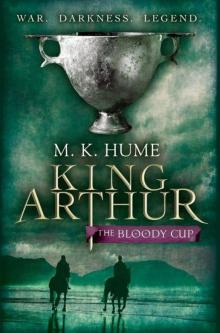 King Arthur: The Bloody Cup: Book Three
King Arthur: The Bloody Cup: Book Three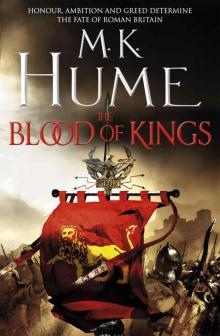 The Blood of Kings: Tintagel Book I
The Blood of Kings: Tintagel Book I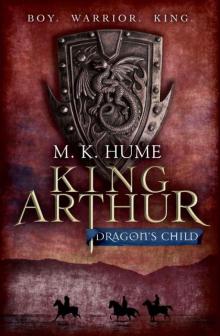 King Arthur: Dragon's Child: Book One (King Arthur Trilogy 1)
King Arthur: Dragon's Child: Book One (King Arthur Trilogy 1) King Arthur: Warrior of the West: Book Two
King Arthur: Warrior of the West: Book Two The Storm Lord
The Storm Lord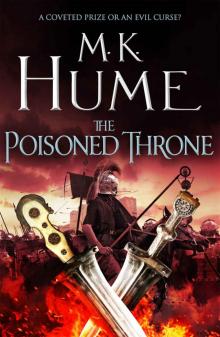 The Poisoned Throne: Tintagel Book II
The Poisoned Throne: Tintagel Book II![M. K. Hume [King Arthur Trilogy 04] The Last Dragon Read online](http://i1.bookreadfree.com/i2/04/07/m_k_hume_king_arthur_trilogy_04_the_last_dragon_preview.jpg) M. K. Hume [King Arthur Trilogy 04] The Last Dragon
M. K. Hume [King Arthur Trilogy 04] The Last Dragon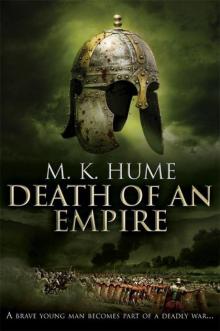 Prophecy: Death of an Empire: Book Two (Prophecy Trilogy)
Prophecy: Death of an Empire: Book Two (Prophecy Trilogy)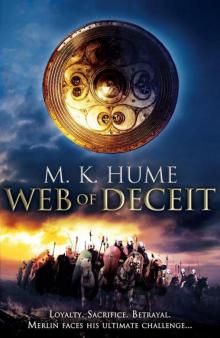 Prophecy: Web of Deceit (Prophecy 3)
Prophecy: Web of Deceit (Prophecy 3)